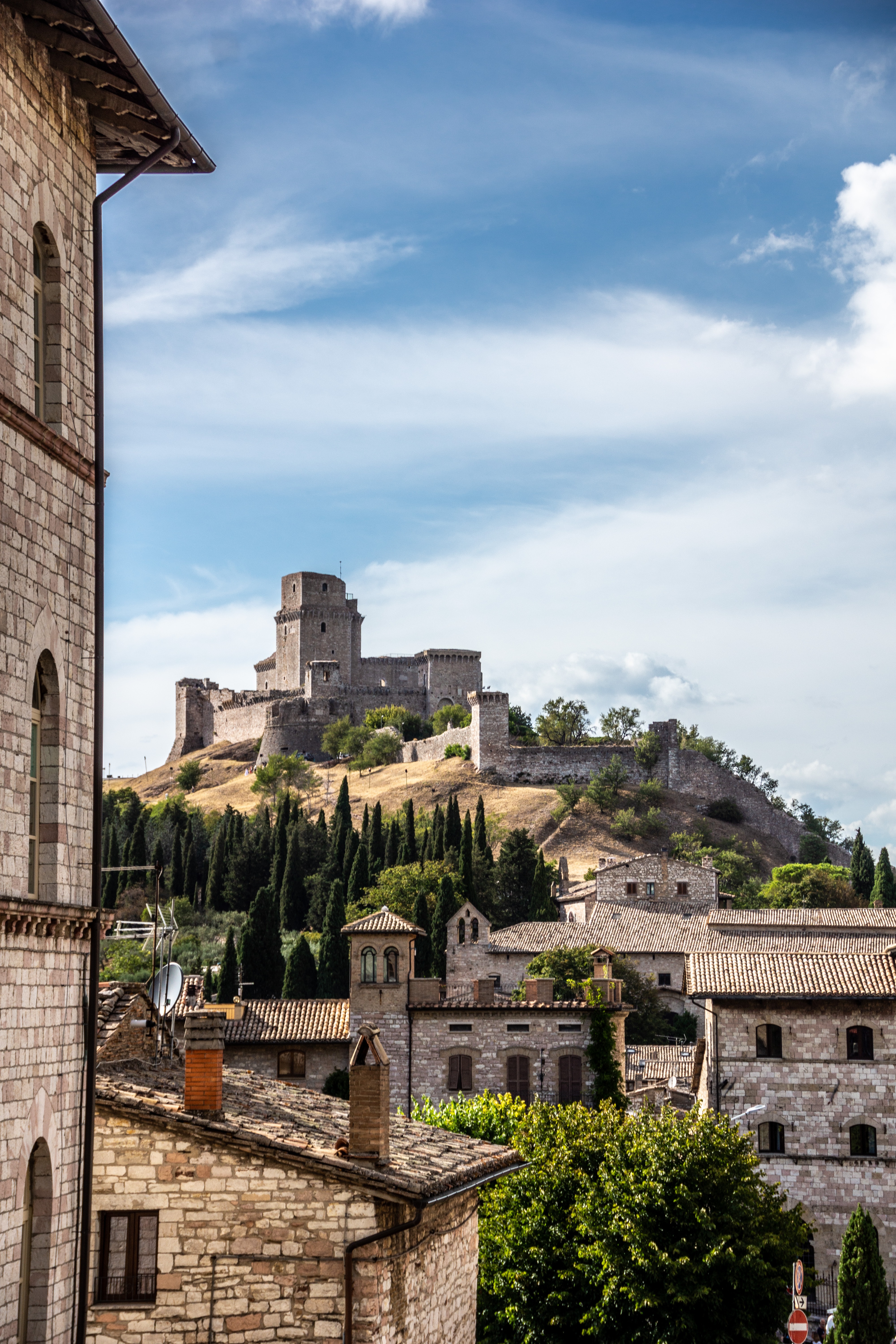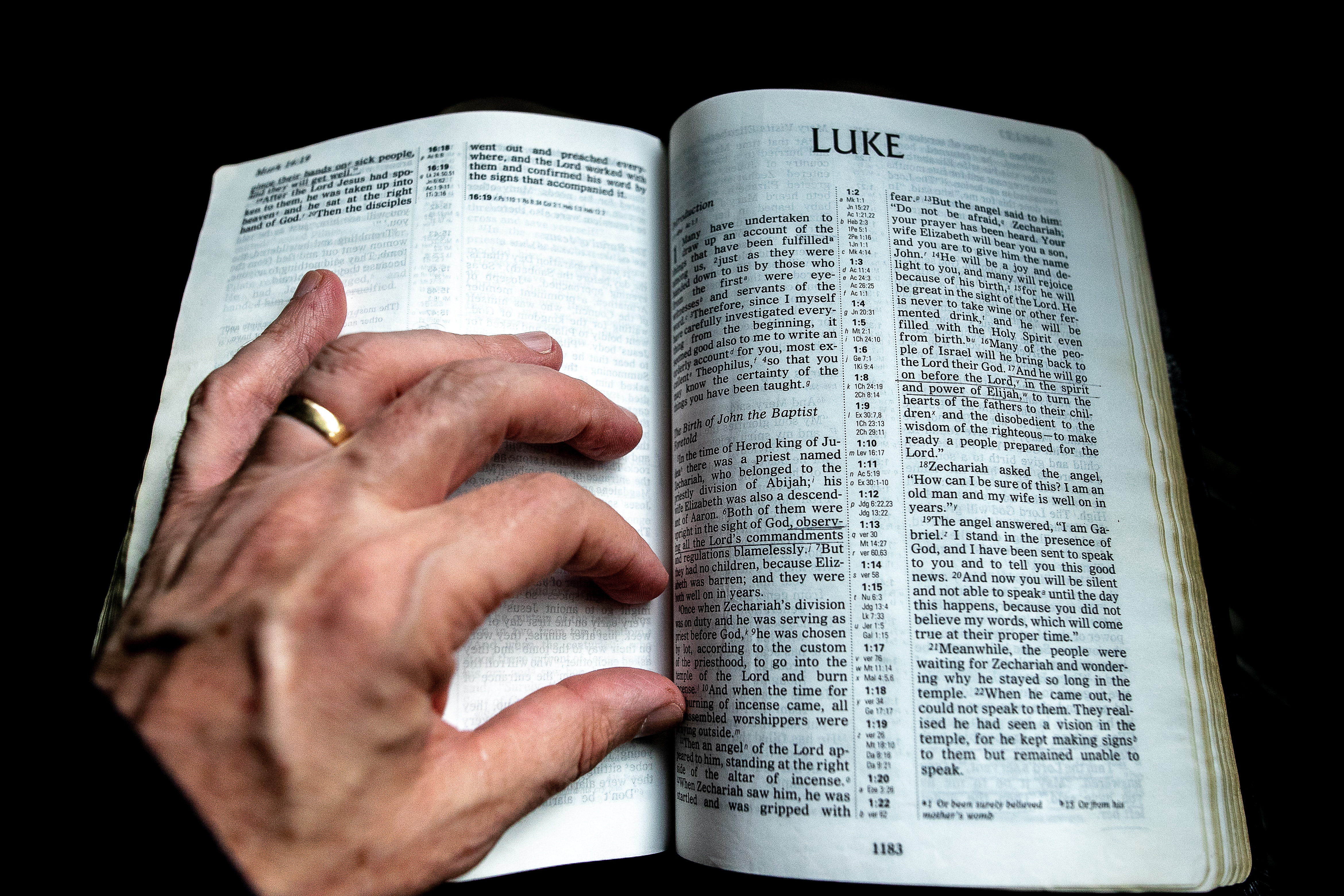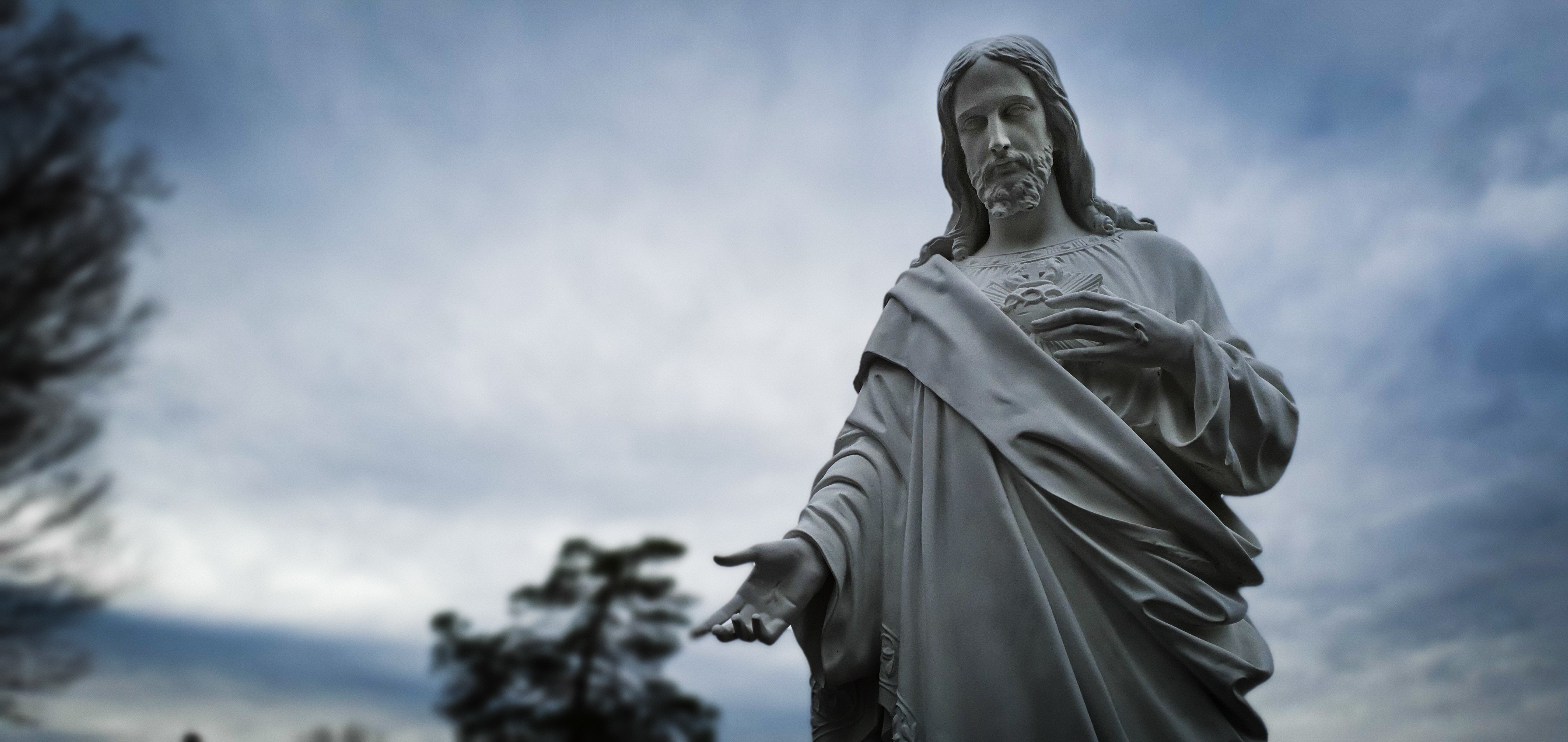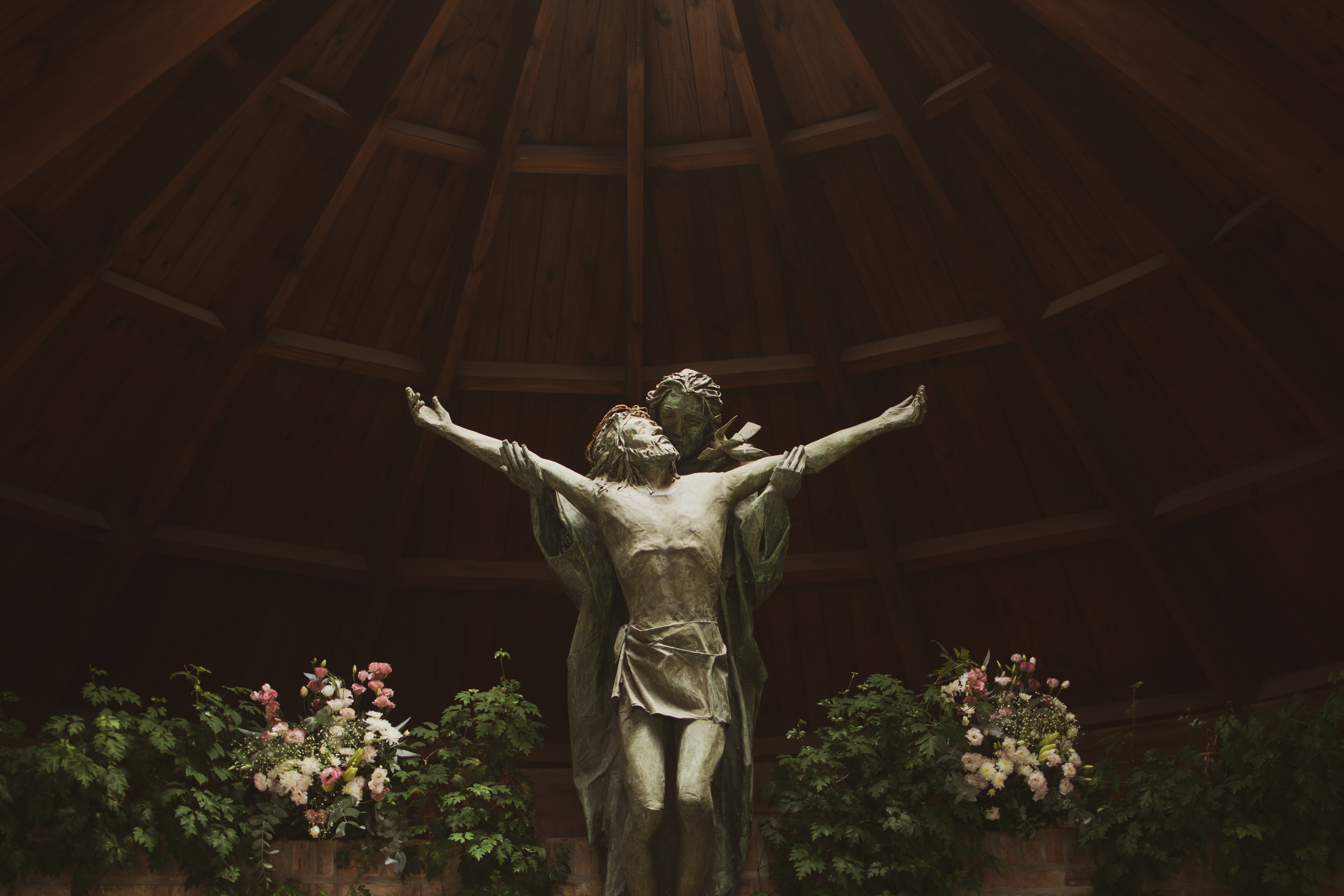Today’s Gospel is a reminder to live our faith out loud. “Everyone who acknowledges me before others, the Son of Man will acknowledge before the Angels of God.” What does this look like in your life?
For me, I try to be consistent in the way I treat my family and the way I treat others. I strive to be as Catholic in my public life as I am in my private life. I attempt to spend money in ways that support charitable causes and care for the poor. I hope that my life points people toward Christ.
How do we defend our faith? Verse 12 shares that “The Holy Spirit will teach you at the moment what you should say.”
In pop culture, I perceive a slippery temptation to remove God from even the most holy aspects of life and history. For example, there’s a delicious TV show called Stanley Tucci: Searching for Italy. So many aspects of the show are beautiful: the scenery, the interviews, the food!
In one episode of the show, Stanley Tucci visits the Umbria region of Italy and lands in Assisi, the home of Saints Francis, Clare, and now the resting place of Blessed Carlo Acutis. The show features mouth-watering cuisine of the region: boar ragu, truffle pasta, and local wines.
However, as I watched the Assisi episode, I was vexed by the narration. As Tucci climbs the hill toward the Basilica of Saint Francis, the narrator offers that this is the home of Saint Francis, who received a vision to serve the poorest of the poor and that he had a strong attachment to nature. Upon entering the Basilica, the film features the beautiful fresco of Saint Francis preaching to the birds and offers that he loved nature and birds.
The show massively whitewashed why we actually venerate Saint Francis and celebrate his feast day. Francis received a call from Jesus Himself from the San Damiano crucifix to rebuild the Church, and he embraced radical poverty with radical joy, as a way to draw near to Christ. Francis saw the Divine reflected in nature; Brother Moon and Sister Stars reminded Francis of his relationship to God’s creation. He preached to the birds, not for the birds’ sake, but as a means of prayer.
Unfortunately, the TV show would have us believe that Francis was just an altruistic dude who liked birds. In reality, Francis loved Jesus and lived a life that drew people toward the Divine. His legacy is one of discipleship.
Do you see opportunities in your life to acknowledge who Jesus is and what he means to you? Perhaps it’s by living more simply, or taking care of God’s creation as Francis did. Perhaps it’s by slowing down to take time at daily Mass or adoration. Pray today that the Holy Spirit might help you to live your faith out loud.
El Evangelio de hoy es un recordatorio de vivir la fe en voz alta. “Yo les aseguro que a todo aquel que me reconozca abiertamente ante los hombres, lo reconocerá abiertamente el Hijo del hombre ante los ángeles de Dios”. ¿Cómo se ve esto en tu vida?
Para mí, intento ser coherente entre la forma que trato a mi familia y la forma que trato a los demás. Me esfuerzo por ser tan católica en la vida pública como lo soy en la vida privada. Intento gastar dinero en formas que apoyen causas benéficas y cuiden a los pobres. Espero que mi vida señale a las personas hacia Cristo.
¿Cómo defendemos la fe? El versículo 12 comparte que “el Espíritu Santo les enseñará en aquel momento lo que convenga decir’”.
En la cultura pop, percibo una tentación resbaladiza de quitar a Dios incluso de los aspectos más sagrados de la vida y la historia. Por ejemplo, hay un delicioso programa de televisión llamado Stanley Tucci: Searching for Italy. ¡Muchos aspectos del programa son hermosos: el escenario, las entrevistas, la comida!
En un episodio del programa, Stanley Tucci visita la región de Umbría en Italia y aterriza en Asís, el hogar de los santos Francisco y Clara y ahora también el lugar de descanso del beato Carlo Acutis. El programa presenta la deliciosa comida de la región: ragú de jabalí, pasta con trufa y vinos locales.
Sin embargo, mientras miraba el episodio sobre Asís, me molestó la narración. Mientras Tucci sube la colina hacia la Basílica de San Francisco, el narrador explica que es el hogar de San Francisco, quien recibió una visión para servir a los más pobres y que tenía un fuerte apego a la naturaleza. Al entrar en la Basílica, el programa presenta el hermoso fresco de San Francisco predicando a los pájaros y explica que amaba la naturaleza y los pájaros.
El programa malinterpretó gravamente la razón por qué en realidad veneramos a San Francisco y celebramos su fiesta. Francisco recibió una llamada del mismo Jesús desde el crucifijo de San Damián para reconstruir la Iglesia, y aceptó vivir la pobreza radical con alegría radical, como una forma de acercarse a Cristo. Francisco vio lo divino reflejado en la naturaleza, el hermano luna y las hermanas estrellas le recordaron a Francisco de su relación con la creación de Dios. Predicó a los pájaros, no por el bien de los pájaros, sino como un medio de oración.
Desafortunadamente, el programa de televisión nos haría creer que Francis era solo un tipo altruista al que le gustaban los pájaros. En realidad, Francisco amaba a Jesús y vivía una vida que atraía a las personas hacia lo divino. Su legado es que era discípulo.
¿Ves oportunidades en tu vida de reconocer quién es Jesús y lo que significa para ti? Tal vez sea viviendo de forma más sencilla o cuidando la creación de Dios como lo hizo Francisco. Tal vez sea bajando la velocidad de tu vida para tomar tiempo en la misa diaria o en la adoración. Pide hoy al Espíritu Santo que te ayude a vivir la fe en voz alta.
 Elizabeth Tomlin is the author of Joyful Momentum: Building and Sustaining Vibrant Women’s Groups and contributing author to the Ave Prayer Book for Catholic Mothers. She is General Counsel for the Archdiocese for the Military Services, USA. Elizabeth is an Army wife and mother of three and currently lives in the DC area. She blogs at JoyfulMomentum.org or @elizabethannetomlin on social media.
Elizabeth Tomlin is the author of Joyful Momentum: Building and Sustaining Vibrant Women’s Groups and contributing author to the Ave Prayer Book for Catholic Mothers. She is General Counsel for the Archdiocese for the Military Services, USA. Elizabeth is an Army wife and mother of three and currently lives in the DC area. She blogs at JoyfulMomentum.org or @elizabethannetomlin on social media.
Feature Image Credit: Achim Ruhnau, unsplash.com/photos/V5nQIoPjzyE




 A lover of Jesus Christ, a wife, and a mother of five, Christine is the author of Everyday Heroism: 28 Daily Reflections on the Little Way of Motherhood. She is a graduate of Franciscan University, an instructor for the Institute for Excellence in Writing, and an experienced catechist. Thrilled to have recently become grandparents, she and her husband currently live in Upstate, NY. Visit her author webpage at
A lover of Jesus Christ, a wife, and a mother of five, Christine is the author of Everyday Heroism: 28 Daily Reflections on the Little Way of Motherhood. She is a graduate of Franciscan University, an instructor for the Institute for Excellence in Writing, and an experienced catechist. Thrilled to have recently become grandparents, she and her husband currently live in Upstate, NY. Visit her author webpage at 
 Mike Karpus is a regular guy. He grew up in Michigan’s Upper Peninsula, graduated from Michigan State University and works as an editor. He is married to a Catholic school principal, raised two daughters who became Catholic school teachers at points in their careers, and now relishes his two grandchildren, including the older one who is fascinated with learning about his faith. He also has served on a Catholic school board, a pastoral council and a parish stewardship committee. He currently is a lector at Mass, a Knight of Columbus, Adult Faith Formation Committee member and a board member of the local Habitat for Humanity organization. But mostly he’s a regular guy.
Mike Karpus is a regular guy. He grew up in Michigan’s Upper Peninsula, graduated from Michigan State University and works as an editor. He is married to a Catholic school principal, raised two daughters who became Catholic school teachers at points in their careers, and now relishes his two grandchildren, including the older one who is fascinated with learning about his faith. He also has served on a Catholic school board, a pastoral council and a parish stewardship committee. He currently is a lector at Mass, a Knight of Columbus, Adult Faith Formation Committee member and a board member of the local Habitat for Humanity organization. But mostly he’s a regular guy.
 David Dashiell is a freelance author and editor in Nashville, Tennessee. He has a master’s degree in theology from Franciscan University, and is the editor of the anthology
David Dashiell is a freelance author and editor in Nashville, Tennessee. He has a master’s degree in theology from Franciscan University, and is the editor of the anthology 
 Kathryn Mulderink, MA, is married to Robert, Station Manager for Holy Family Radio. Together they have seven children (including Father Rob), and seven grandchildren. She is President of the local community of Secular Discalced Carmelites and has published five books and many articles. Over the last 30 years, she has worked as a teacher, headmistress, catechist, Pastoral Associate, and DRE, and as a writer and voice talent for Catholic Radio. Currently, she serves the Church by writing and speaking, and by collaborating with various parishes and to lead others to encounter Christ and engage their faith. Her website is
Kathryn Mulderink, MA, is married to Robert, Station Manager for Holy Family Radio. Together they have seven children (including Father Rob), and seven grandchildren. She is President of the local community of Secular Discalced Carmelites and has published five books and many articles. Over the last 30 years, she has worked as a teacher, headmistress, catechist, Pastoral Associate, and DRE, and as a writer and voice talent for Catholic Radio. Currently, she serves the Church by writing and speaking, and by collaborating with various parishes and to lead others to encounter Christ and engage their faith. Her website is 
 Allison Gingras (
Allison Gingras ( 
 Susan Ciancio has a BA in psychology and a BA in sociology from the University of Notre Dame, with an MA in liberal studies from Indiana University. For the past 19 years, she has worked as a professional editor and writer, editing both fiction and nonfiction books, magazine articles, blogs, educational lessons, professional materials and website content. Thirteen of those years have been in the pro-life sector. Currently Susan freelances and writes weekly for HLI, edits for American Life League, and is the executive editor of Celebrate Life Magazine. She also serves as executive editor for the Culture of Life Studies Program—an educational nonprofit program for K-12 students. You can reach her at
Susan Ciancio has a BA in psychology and a BA in sociology from the University of Notre Dame, with an MA in liberal studies from Indiana University. For the past 19 years, she has worked as a professional editor and writer, editing both fiction and nonfiction books, magazine articles, blogs, educational lessons, professional materials and website content. Thirteen of those years have been in the pro-life sector. Currently Susan freelances and writes weekly for HLI, edits for American Life League, and is the executive editor of Celebrate Life Magazine. She also serves as executive editor for the Culture of Life Studies Program—an educational nonprofit program for K-12 students. You can reach her at 
 J.M. Pallas has had a lifelong love of Scriptures. When she is not busy with her vocation as a wife and mother to her “1 Samuel 1” son, or her vocation as a public health educator, you may find her at her parish women’s bible study, affectionately known as “The Bible Chicks.”
J.M. Pallas has had a lifelong love of Scriptures. When she is not busy with her vocation as a wife and mother to her “1 Samuel 1” son, or her vocation as a public health educator, you may find her at her parish women’s bible study, affectionately known as “The Bible Chicks.”
 Merridith Frediani loves words and is delighted by good sentences. She also loves Lake Michigan, dahlias, the first sip of hot coffee in the morning, millennials, and playing Sheepshead with her husband and three kids. She writes for Catholic Mom, Diocesan.com, and her local Catholic Herald. Her first book Draw Close to Jesus: A Woman’s Guide to Adoration is available at Our Sunday Visitor and Amazon. You can learn more at
Merridith Frediani loves words and is delighted by good sentences. She also loves Lake Michigan, dahlias, the first sip of hot coffee in the morning, millennials, and playing Sheepshead with her husband and three kids. She writes for Catholic Mom, Diocesan.com, and her local Catholic Herald. Her first book Draw Close to Jesus: A Woman’s Guide to Adoration is available at Our Sunday Visitor and Amazon. You can learn more at 

